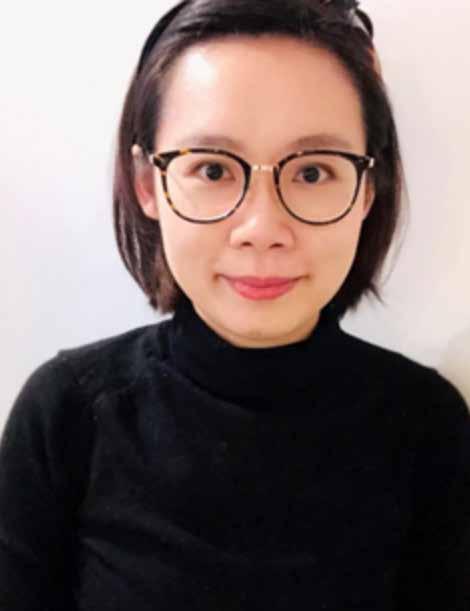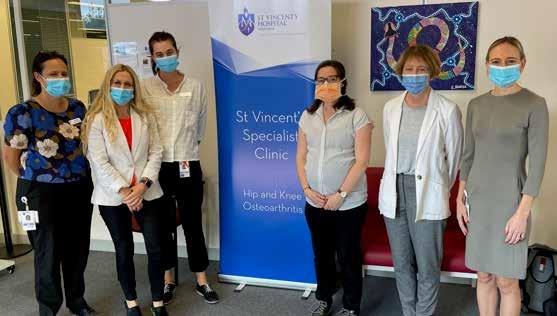
11 minute read
3MBS Dante700 Festival 12St Vincent’s Hospital’s CARE project 14The 2021 Australian Graduate Women Research Fellows
3MBS DANTE700 FESTIVAL
Meet Margot Costanzo, lawyer, and Karen van Spall, mezzo soprano, the co curators of the 3MBS Dante 700 Festival. Margot is one of the producers and presenters of 2 hour programs in the Illuminations series every Thursday night on 3MBS. She also presents the Divertimento program on midday Thursdays. Karen is a technical producer. Between these two people, they have five degrees. We will leave you to work out who has what – a law degree (Honours) a masters in law, an arts degree majoring in Italian and German, a music performance degree, all from the University of Melbourne and an MBA in Arts Management from RMIT. This Festival has been spun out of the five part, 10 hour 3MBS Illuminations series Dante in Music. It commemorates in lectures, broadcast, live performance and a 10 hour Illuminations series, the 700 year poetic contribution of Dante Alighieri through his great work the Divine Comedy. Through this Festival, you too can celebrate the inspiration found in this work by Listz, Rachmaninoff, Granados, Tchaikovsky and Verdi to mention just a few great composers. The Festival offers something for everyone: For the merely curious or the informed Italophile - a Lecture series called Out of Exile that explores the Divine Comedy, Dante’s poetic achievement and the art that it inspired. The lectures will take place during August at CO.AS.IT in Carlton, Covid permitting. For regular 3MBS listeners and new listeners - a Broadcast Festival between September 13 and September 19 with live to air performances, the most famous musical works, and interviews from the curators, performers and experts; For live music lovers - live performances of work inspired by the Divine Comedy in a program called The Love that Moves the Stars during September in venues around Melbourne; With the State Library, an opportunity for everyone to explore Dante holdings of books and art works from the State Library and the NGV until 31st July 2022. For the duration of the State Library exhibition, the opportunity to listen to the whole 10 hours of the Dante in Music presented by Margot Costanzo and technically produced by Karen van Spall streamed from the website at your leisure. The Festival website is still being finalised, but you can enrol now for one or more of the free Lectures at CO.AS.IT., 189 Faraday Street Carlton. Briefly, the dates are: • 10th August 2021, from 6:30 to 8:00pm - Margot
Advertisement
Costanzo, Why Should the General Reader Care about Dante? • 24th August 24 2021, from 6:30 to 8:00pm - Dr
Simon West, The Poetic Beauty of Dante • 31st August 2021, from 6:30 to 8:00pm - Dr Petra
Kayser and Dr Anna Welch, The Dante Collection from the National Gallery of Victoria and the
Holdings from the State Library of Victoria • 28th October 22021, from 6:30 to 8:00pm - Diana
Glenn, The Women of the Divine Comedy To find out more about lectures and to book, go to: https://www.coasit.com.au/events/eventsarchive/804-costanzo-2021-0 To stream the Dante in Music series, or to read more about Festival events, go to: https:// www.3mbsdante700festival.org.au
From left to right: Emma Martin (CARE Project Officer), Lena Argyropoulos (Administration Assistant, Fairfield CRC), Laura Trumble (Physiotherapist, Fairfield CRC), Michelle McConnell (Physiotherapist, OAHKS), Carolyn Page (CARE Project Lead) and Katherine Roberts-Thomson (CARE Project Dietician).
ST VINCENT’S HOSPITAL’S CARE PROJECT
St Vincent’s Hospital Melbourne was successful in obtaining grant funding from the Victorian Department of Health and Human services in 2019 to pilot a model of care to improve the outcomes for people with hip and knee osteoarthritis (OA). Hip and knee OA is highly prevalent and poses a significant burden at both the individual and societal level. Long delays to access specialist clinics for patients, are endemic in major hospitals in Victoria. Limited alternative options for community based care means that specialist outpatient clinics in tertiary hospitals provide the majority of services to patients that have been identified by GPs as requiring additional expert assessment and management. This pathway currently results in significant delays in accessing appropriate care. Multiple national and international guidelines clearly outline the evidence-based, non-surgical management that all people with hip and knee
OA should be offered (NICE UK 2014, RACGP 2009). However, it is reported that up to 57% of Australians do not receive appropriate care and support for their hip and knee OA (Runciman et al. 2012). Innovative models of service delivery are required to more effectively meet peoples’ needs and ensure comprehensive, integrated evidence-based care is delivered more systematically. The St Vincent’s project, titled CARE (Community Arthritis Rehabilitation and Evaluation), is aimed at developing a centre of excellence for the management of hip and knee osteoarthritis from the initial GP referral through to accessing the right care in a timely and co-ordinated approach. A specialist clinic called Osteoarthritis Hip and Knee Service (OAHKS) was set up in St Vincent’s Community Rehabilitation Centre (CRC), located in Kew and Fairfield. The OAHKS model of care was introduced to many Victorian tertiary-based hospitals over 15 years ago. The aim of the OAHKS was to improve access to specialist assessment and assist in the prioritisation of patients for joint replacement. As part of our community-based OAHKS clinic, we developed a clinical role to help patients navigate the options available and improve access to appropriate non-surgical care for their hip and knee OA. Appropriate non-surgical care would cover the four key domains of managing hip and knee OA, that is: exercise, knowledge of the disease, nutrition and pain management. The community-based OAHKS has been operating since February 2020. Not long after commencement of this project, the COVID-19 pandemic hit which threatened to stall a number of projects across the state. However, with support from St Vincent’s management and access to appropriate infrastructure, the project was able to continue via telehealth. From March 2020 to late November 2020, patients were seen exclusively via telehealth and they were able to receive their initial assessment in the Community OAHKS, discuss and review options for non-surgical care and commence non-surgical management of their hip or knee OA. In late November 2020, the clinic was able to start transitioning back to face to face reviews albeit with a number of precautions in place to ensure the community’s ongoing safety. Pictured on page 12 is the team involved in the project at St Vincent’s Community Rehabilitation Centre in Fairfield in April 2021. Over a nearly 18-month period, this clinic saw 500 patients. A qualitative evaluation of this project indicated that the clinic filled a critical gap in patients’ understandings of the options they have, beyond just surgery, to manage their hip and knee OA. Less than 10% of the patients seen in the clinic required a surgical review which was co-ordinated in a timely manner. We are currently exploring options to sustain this new model of care in St Vincent’s Hospital Melbourne. If you have hip or knee osteoarthritis, make sure you talk to your General Practitioner about the non-surgical options available to manage your condition. For more information about arthritis, current research projects and ways to get involved, we recommend visiting the Musculoskeletal Australia website: https://www.msk.org.au/ If you would like further information about the CARE project, please direct your queries to Carolyn Page at the following email address: OAHipandKneeService@svha.org.au
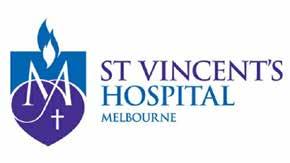

THE 2021 AUSTRALIAN GRADUATE WOMEN RESEARCH FELLOWS
Australian Graduate Women (AGW), in existence since 1920, is the national voice of graduate women working through initiatives in education for the advancement and wellbeing of women and girls. Each year, AGW calls for women undertaking PhD research at any Australian university to apply for AGW Research Fellowships and financial assistance. The Research Fellowships are named in honour of two remarkable graduate women. Barbara Hale (1924–2013) held two Master’s degrees - one in English from the University of New Zealand, and another in Librarianship from Sheffield University (UK). Barbara was the first woman to serve on the Senate of the University of Western Australia (UWA). After a career as a senior UWA librarian (1961-1984) she contributed significantly to AGW (then named Australian Federation of University Women) and Graduate Women WA. Georgina Sweet (1875-1946) was one of the founding members of our membership association in 1911 (then called Melbourne University (Graduates) Association) and the founding President of Graduate Women Victoria in 1920. Holding three degrees from The University of Melbourne, a Bachelor (1896), Master (1898) and Doctor (1904) of Science , she undertook zoological research until retirement in 1924. Georgina was the University’s first female associate professor and member of Council; and was awarded an OBE (1935) for her significant contribution to her discipline and to many organisations (Australian National Research Council, Australasian Association for the Advancement of Science, the Royal Society of Victoria, the Field Naturalists’ Club, Lyceum Club, Young Women’s Christian Association [YMCA], Pan-Pacific Women’s Association). After a competitive nationwide application and comprehensive evaluation process, the two
FEATURES
Barbara Hale Fellowships were awarded to Thuc Hao (Halle) Quang and Lauren Alesi, and the Georgina Sweet Fellowship was awarded to Yao (Jackie) Lu.
Barbara Hale Fellow, Thuc Hao (Halle) Quang, holds a Bachelor’s degree (with Honours) in Psychology and Education from Ho Chi Minh University of Education in Vietnam and an MSc in Brain and Mind Science from the University of Sydney. As a current Scientia PhD candidate at the School of Psychology, University of New South Wales, Halle’s research investigates how and why people with neurological disorders have reduced motivation and apathy, a condition that can seriously affect quality of life for patients and for their carers. Her current research has developed a behavioural paradigm - the Gift Collection Task - to characterise whether patients have apathy because of reduced sensitivity to intrinsic reward (i.e., lack of interest and enjoyment in the activity per se), or extrinsic reward (i.e., lack of perception that the activity can bring some benefits such as income and respect), or both. Understanding this could lead to better treatment methods and outcomes. The funds from the AGW Fellowship will enable her to apply and validate the task she has developed within a new clinical cohort, patients with Parkinson’s disease. In the words of one of her referees “By taking this transdiagnostic approach to investigate symptoms that are common across different neurological and neurodegenerative disorders, her research will have greater impact and add significant value to the field of neuropsychology.” To carry out her project she will spend five months working in inter-institutional collaboration with Dr Trevor Chong at the Monash University’s Cognitive Neurology Laboratory, which has ongoing experience with patients with Parkinson’s disease and expertise in reward-based decisionmaking research.
Barbara Hale Fellow Lauren Alesi, is a doctoral candidate at the Monash Biomedicine Discovery Institute, within the department of Anatomy and Developmental Biology at Monash University. She also completed her undergraduate studies at Monash University, receiving her Bachelor of Science (Honours) in 2019. Her Honours project – which focussed on characterising the impact of emerging cancer
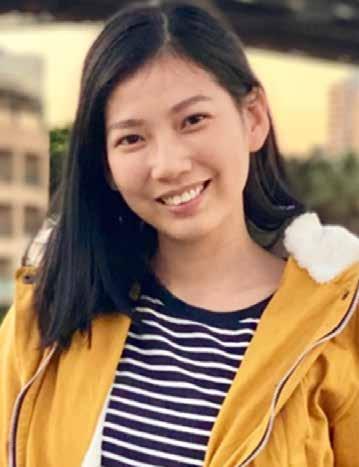
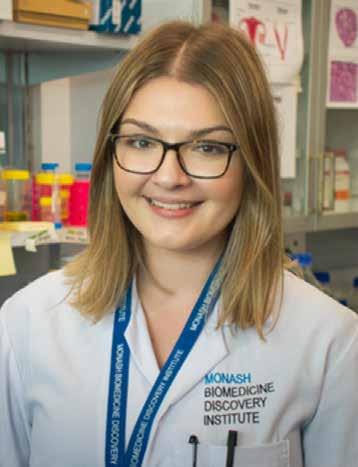
therapies on ovarian function – ignited her passion for research and motivated her to pursue her doctoral studies. Lauren has a keen interest in female reproductive biology and fertility. Her PhD project is focussed on preserving fertility and endocrine health in female cancer patients. Utilising a mouse model, her research investigates a novel pharmaceutical fertility preservation technique which hopes to be the first to simultaneously preserve fertility and prevent premature menopause from occurring, with promising results already shown in her pilot studies. In her fellowship project, Lauren hopes to obtain the vital information to optimise the dose of this newly-available drug for maximal ovarian protection against chemotherapy. This will be achieved through collaboration with experts at Monash University who specialise in metabolomics, so that she can learn to use expensive and highly specialised techniques that extend beyond the skillset and expertise that she and the Ovarian Biology Laboratory currently possess. The work undertaken in this fellowship project is critical for the research and development of this new fertility preservation strategy. A pharmaceutical option such as this, which could stop ovarian damage from occurring in the first place, would revolutionise the landscape of oncological fertility preservation. Georgina Sweet Fellow, Yao (Jackie) Lu, completed a Bachelor of Biomedical Sciences at the University of Adelaide and a BSc (Hons) at the Florey Institute at The University of Melbourne. Jackie is currently a PhD student at the Monash Institute of Pharmaceutical Sciences at Monash University, where she previously worked as a research assistant in the Molecular and Translational Drug Discovery laboratory - her referees there having described her as “an accomplished laboratory scientist”. The focus of her PhD research is to understand the molecular mechanisms of activation of a promising receptor protein as a potential target for treating schizophrenia. She seeks to provide a molecular explanation of how some small molecules can confer their antipsychotic activity for the development of new drugs for the treatment of schizophrenia. With the development of cryo-electron microscopy (cryo-EM) imaging, high-resolution images of receptor protein structures have become increasingly accessible. Jackie will use the Fellowship funds to access a world-leading cryoEM facility at the University of Tokyo. She will also be able to participate personally in imaging sessions, thereby learning new skills associated with cryo-EM (sample preparation and screening) and creating career-enhancing networks within the structural biology community. The Georgina Sweet fellowship will provide the backing to accelerate breakthrough drug discovery and the career of a future scientific leader.
